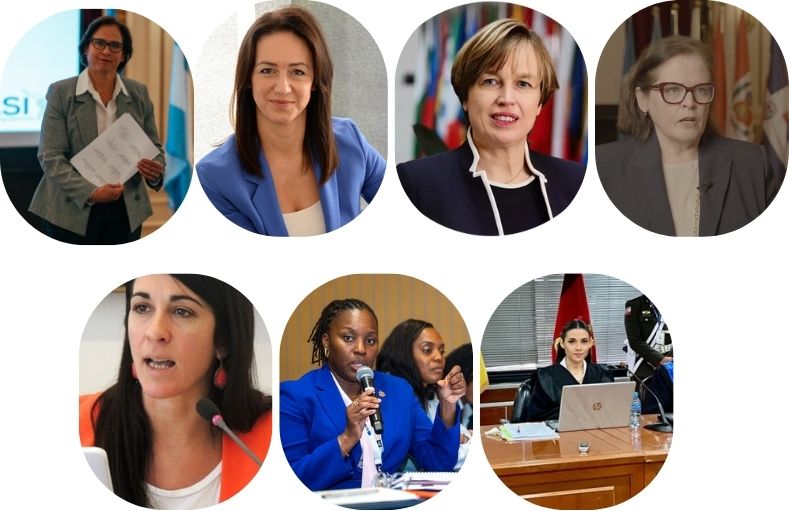Opening session ‘Women in security and justice: breaking gender barriers in the fight against CTO’ English version
On the occasion of International Women's Day, 8 March 2025, we are launching the first series of debates "Women and Transnational Organized Crime" on LA HORA DE EL PACCTO 2.0.
We introduce our first seven guests, to whom we extend our gratitude for sharing their valuable insights on the roles of women in criminal organizations and the approaches taken by security and justice institutions to address this complex issue. Additionally, they shared reflections on the progress achieved in combating organized crime, drawing from their vast experience and professional expertise.
They examine the roles of women within criminal organizations, delving into their involvement as both victims and perpetrators. The analysis further underscores the institutional challenges of addressing these dynamics from a gender perspective. They highlight the importance of empowering those working in this fight, especially women in decision-making positions. They assess the conditions of vulnerability and how justice and security institutions can adapt their regulations and tools to recognize the status of victims and take gender-specific considerations into account in the context of organized crime.
Throughout this journey, we will explore the role of women from two distinct perspectives: those who stand on the frontlines combating crime and those immersed in criminal organizations.
To all our guests, we extend our heartfelt thanks from LA HORA DE EL PACCTO 2.0.
1 Carolina Leitao, Undersecretary for Crime Prevention in Chile, (Pro Tempore Presidency of CLASI 2025-2026) described the institutional challenge of incorporating a gender perspective into the fight against organized crime and how women face higher standards when they take on important positions.
She is a lawyer from the University of Chile and served as Mayor of Peñalolén from 2012 to 2024. Since 2022, she has been the President of the Chilean Association of Municipalities, becoming the first woman to hold this position. Previously, she worked as the Housing Manager for the Municipality of Peñalolén and Community and Family Manager, among other roles. Additionally, she was a councilor in Providencia from 2000 to 2012.
2 Catherine De Bolle, Executive Director of Europol since 2018, she highlights how he has witnessed the strengthening of police institutions and communities when there is gender equity. He considers it a holistic issue in society and not specific to the security sector, requiring the inclusion of everyone in the discussion, especially men."
From March 2012 to April 2018, she served as Commissioner General of the Belgian Federal Police. From November 2001 to February 2012, she was Chief of Local Police in the city of Ninove. From 1994 to November 2001, she worked as a lawyer and official at the General Directorate of Human Resources of the Gendarmerie.
3 Margarita Šniutytė-Daugėlienė -Vice President of Eurojust since 2022, she highlights that women bring a unique perspective that strengthens the legitimacy of the courts by offering a deeper understanding of issues that disproportionately affect women.
A national deputy for Lithuania, she was elected Vice President of Eurojust on June 28, 2022. She has represented the Lithuanian judiciary at Eurojust since 2019. She began her legal career as a prosecutor at the Klaipeda Regional Prosecutor's Office. In 2012, she was promoted to Chief Prosecutor of the 2nd Criminal Prosecution Division of the Klaipeda Regional Prosecutor's Office. In 2016, she was appointed Deputy Prosecutor General.
4 María Luisa Domínguez, Senior Project Officer of EL PACCTO 2.0, mentions the program's gender strategy and the challenges associated with incorporating gender into international cooperation and public institutions to combat transnational organized crime.
She is an expert in judicial modernization, governance, and international cooperation. She has worked on multiple projects with the European Commission, the Inter-American Development Bank, AECID, and the United Nations Development Programme (UNDP), as well as the Spanish Ministry of Justice. She has extensive knowledge of justice administration in Spain and Latin America.
5 Mariela Labozzetta, Federal Prosecutor, Public Prosecutor's Office of Argentina, describes the principles of gender-based violence, the roles of women in the CTO, and how prosecutors' offices must incorporate tools that enable distinguishing a victim from a perpetrator.
She is a Federal Prosecutor and Head of the Specialized Prosecutor's Unit on Violence Against Women (UFEM) within Argentina's Public Prosecutor's Office. She also serves as Coordinator of the Gender Specialized Network of the Ibero-American Association of Public Prosecutors (AIAMP). She has participated in national and international projects aimed at developing investigation protocols for crimes related to gender-based violence and is a specialized instructor in the subject.
6 Nadine Bushell, Assistant Director of CARICOM - IMPACS, presents the different roles of women in the CTO and their foundations.
She is the Program Coordinator at CARICOM IMPACS, where she is responsible for managing the organization's portfolio of programs and projects. This includes the formulation, implementation, monitoring, and evaluation of projects, as well as resource mobilization. She holds a master's degree in Development and Project Planning and a bachelor's degree in Sociology and Management.
7 Mercedes Caicedo, National Judge of Ecuador, reflects on the importance of incorporating a gender perspective within the administration of justice and her hope of paving the way for other women in the higher courts of justice of the countries.
She holds a Master's degree in Criminal Law and Criminology, as well as a Master's degree in Cultural Law. She is a specialist in gender perspectives and the youngest judge of Ecuador's National Court of Justice, the country’s highest judicial body. She served as the presiding judge in the largest organized crime case in Ecuador related to drug trafficking mafias ("Metastasis"). She has collaborated with the Judicial School and participated as a speaker in multiple events on organized crime. Additionally, she is a university professor, mother, daughter, and woman.

